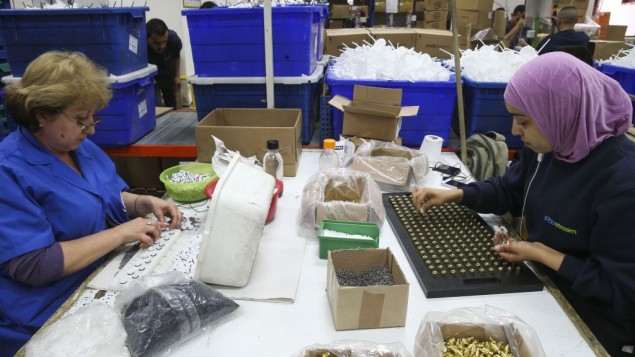The boycott, divest, and sanction movement, which seeks to cut economic ties with Israel, shows no sign of letting up. Yet concern over the possibility that their products will be boycotted has not stopped Israeli manufacturers and exporters from identifying with Israel. Quite the opposite, according to Economy Ministry figures; while in 2013, 760 Israeli manufacturers marked their products marketed abroad as “made in Israel,” by 2014 that number had grown to 1,024.
It was just another indication that Israeli technology is welcome around the world, according to Ohad Cohen, who heads the Foreign Trade Administration in the Israeli Economy Ministry. “BDS campaigns are really only effective against identifiable consumer products, and Israel does export some of these, but most of our production is in intermediate goods – chemicals, machine parts, technology, etc. Israel’s main customers are the businesses that use these components, and for most companies, business is business, and they keep politics out of the picture.
“That’s not to say that some businesses over the Green Line have not been affected,” added Cohen. “But overall we have great products and people around the world are happy to buy them.”
Among those affected companies – and an exception to the labeling rule – might be SodaStream, one of the most identifiable Israeli consumer products sold abroad, which recently changed the labeling on some its products to “made in the West Bank” after a complaint to a consumer agency in the state of Oregon. SodaStream has long been a target of BDS groups and as one of the more prominently identifiable and successful made-in-Israel products with a West Bank settlement connection, it has become a magnet for those protesting Israeli policies regarding the Palestinians.
But the “made in Israel” label will soon be restored, after the companycloses down its factory in Mishor Adumim, east of Jerusalem and outside the Green Line and relocates to a new factory in Beersheba. According to the company, the move comes after the company received substantial grants to locate in a new industrial zone in southern Israel, and was not related to its BDS troubles.
And although there is great pressure on European Union governments, among others, to boycott Israeli – or at least West Bank-manufactured — goods, several experts say that such boycotts might not be such a great idea, after all.
Commenting in a recent interview in Forbes, Kristin Lindow, senior vice president at Moody’s Investors Service and Moody’s lead analyst for Israel, said that “the sanctions do run the risk of hurting the Palestinian economy, which is much smaller and poorer than that of Israel, as seen in the case of SodaStream,” where hundreds of Palestinian Authority resident workers who will not be given permits to work in the Negev factory (which is over 100 kilometers from the Mishor Adumim plant) are likely to be fired.
“The impact of BDS is more psychological than real so far and has had no discernible impact on Israeli trade or the broader economy,” said Lindow.
Despite the SodaStream dust-up, Israel’s export economy is doing better than ever, according to a slew of Ministry statistics released on the eve of Israel Independence Day. Since 1948, manufacturing and employment have grown by leaps and bounds; if in 1948, the country counted 65,000 workers in 2,300 industrial plants, today there are 400,000 workers in 124,000 such plants. As the economy has developed, about half the percentage of the total working population in Israel is today employed in manufacturing as in 1948; today, for example, about 10% of the workforce, or 270,000 people, are employed in high-tech (with most of those jobs in the services sector). Overall, Israeli exports have grown from around $5 million in 1948, to over $47 billion in 2014.
Among the countries that Israel does a great deal of business with – many of them part of free trade agreements between Israel and specific countries, or economic blocs – are countries where there is a great deal of pressure to boycott Israeli products. For example, Israel has a free trade agreement with EFTA-bloc countries (EFTA is the “other” EU, consisting of countries that did not join the original European Economic Community), which include Denmark, Sweden, and Norway – all three of which recently took, or seriously considered, economic sanctions against Israel. But business is business, said Cohen, and study after study shows that the BDS movement is not affecting Israel in a substantial manner.
“We’ve been tracking this very closely since 2006, and we find that trade does suffer during periods of war, like the Second Lebanon War and the wars in Gaza,” said Cohen. “But it bounces back after a couple of months, with a full recovery.”
Even ongoing enmity, it seems, doesn’t change the bottom line; for example, despite Turkey’s perceived negative attitude to Israel, the free trade agreement between the two countries is still in effect, and trade continues apace, with 2014 another record for Israel-Turkey trade.
Commenting on his ministry’s report, Deputy Director General Inon Elroy said that “Israeli industry has become a world leader thanks to its creativity, enterprise, innovation, and advanced technology. We are focusing our activities on finding the middle path between the efforts to reduce the cost of living, and maintaining competition and the uniqueness of Israeli industry. During the coming year, too, we will continue reminding the Israeli public that choosing an Israeli product helps and encourages Israeli industry and increases the employment opportunities it provides.”


